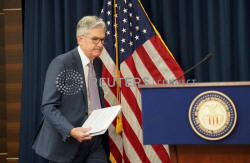Fed's Powell, invoking war effort, calls for national
jobs drive
 Send a link to a friend
Send a link to a friend
 [February 11, 2021] By
Howard Schneider and Ann Saphir [February 11, 2021] By
Howard Schneider and Ann Saphir
WASHINGTON (Reuters) - U.S. Federal Reserve
Chair Jerome Powell, citing the country's push after World War Two to
find jobs for returning soldiers, on Wednesday called for a broad
national effort to get Americans back to work after the pandemic,
particularly minorities and workers ousted from lower-paying jobs.
"Given the number of people who have lost their jobs and the likelihood
that some will struggle to find work in the post-pandemic economy,
achieving and sustaining maximum employment will require more than
supportive monetary policy," Powell said in remarks to the Economic Club
of New York. "It will require a society-wide commitment, with
contributions from across government and the private sector."
Recovery, Powell said, would require both "near-term policy and
longer-run investments" to ensure anyone who wants a job can get one.
While the Fed has already promised that borrowing costs for companies
and households will be kept low as the economy recovers, the scope and
tenor of Powell's remarks align closely with the sort of ambitious
spending proposals being discussed by President Joe Biden and Treasury
Secretary and former Fed Chair Janet Yellen.

Biden is urging Congress to pass a $1.9 trillion emergency spending
bill, and is planning a longer-term infrastructure effort that some
analysts expect will involve trillions of dollars more.
Powell, in keeping with longstanding Fed tradition, did not comment
directly on those proposals, the province of the elected officials who
wield taxing and spending authority.
But in wide-ranging remarks during a question-and-answer session, Powell
said he felt the country needed a more organized and directed strategy
to meet its economic potential - an argument similar to that made by the
current administration as it organizes its investment and spending
plans, and considers major programs for example to lower carbon
emissions.
Again referencing the national effort mobilized in wartime or for
projects like the moon landing, backed by federal spending for basic
science and research, Powell said "it would be great if we had a
national strategy to make the U.S. economy as big, and to make the
prosperity the U.S. has as broadly shared, as possible."
HAPPY AT WORK
Powell is currently in the last year of a four-year term as Fed chair,
and it will be up to Biden to decide in coming months whether to
reappoint him or not.
[to top of second column] |

U.S. Federal Reserve Chairman Jerome Powell arrives to speak to
reporters after the Federal Reserve cut interest rates in an
emergency move designed to shield the world's largest economy from
the impact of the coronavirus, during a news conference in
Washington, U.S., March 3, 2020. REUTERS/Kevin Lamarque

Prompted by a question Powell said without flinching "I love my job," and
arguably there is much for the current White House to love about how Powell has
positioned monetary policy. Appointed by former President Donald Trump but also
a frequent target of Trump's ire, Powell has recast Fed policy over the past
year to put more emphasis on achieving "maximum employment" and has downplayed
the inflation risks that preoccupied his predecessors
The United States remains about 9 million jobs short of where it was a year ago,
and the recovery has been most sluggish for members of minority groups and those
thrown out of lower- paying service jobs in sectors like leisure and hospitality
hard hit by the pandemic.
"The Fed is almost demanding that Congress and the private sector step up and
help the sluggish employment backdrop we’re seeing," said Ryan Detrick, senior
market strategist at LPL Financial in Charlotte, North Carolina.
Financial markets were little changed after Powell's comments.
Though the Fed has no direct say over how the federal government spends money or
how much it raises, central bank policy does influence the interest rate the
government pays and thus the cost particularly of longer-term investments.
During the pandemic, Fed policymakers have generally set concerns about the
level of federal debt to the side and focused more on the economy's immediate
needs.
Powell on Wednesday cemented that stance, noting that after World War Two, as
the economy transitioned from wartime and needed to absorb millions of returning
soldiers into the labor force, the Employment Act of 1946 committed the
government "to use all practicable means" to see that anyone willing and able to
work can find "useful employment."
"At present, we are a long way from such a labor market," he said.
(Reporting by Howard Schneider and Ann Saphir; Additional reporting by Stephen
Culp; Editing by Andrea Ricci)
[© 2021 Thomson Reuters. All rights
reserved.] Copyright 2021 Reuters. All rights reserved. This material may not be published,
broadcast, rewritten or redistributed.
Thompson Reuters is solely responsible for this content. |